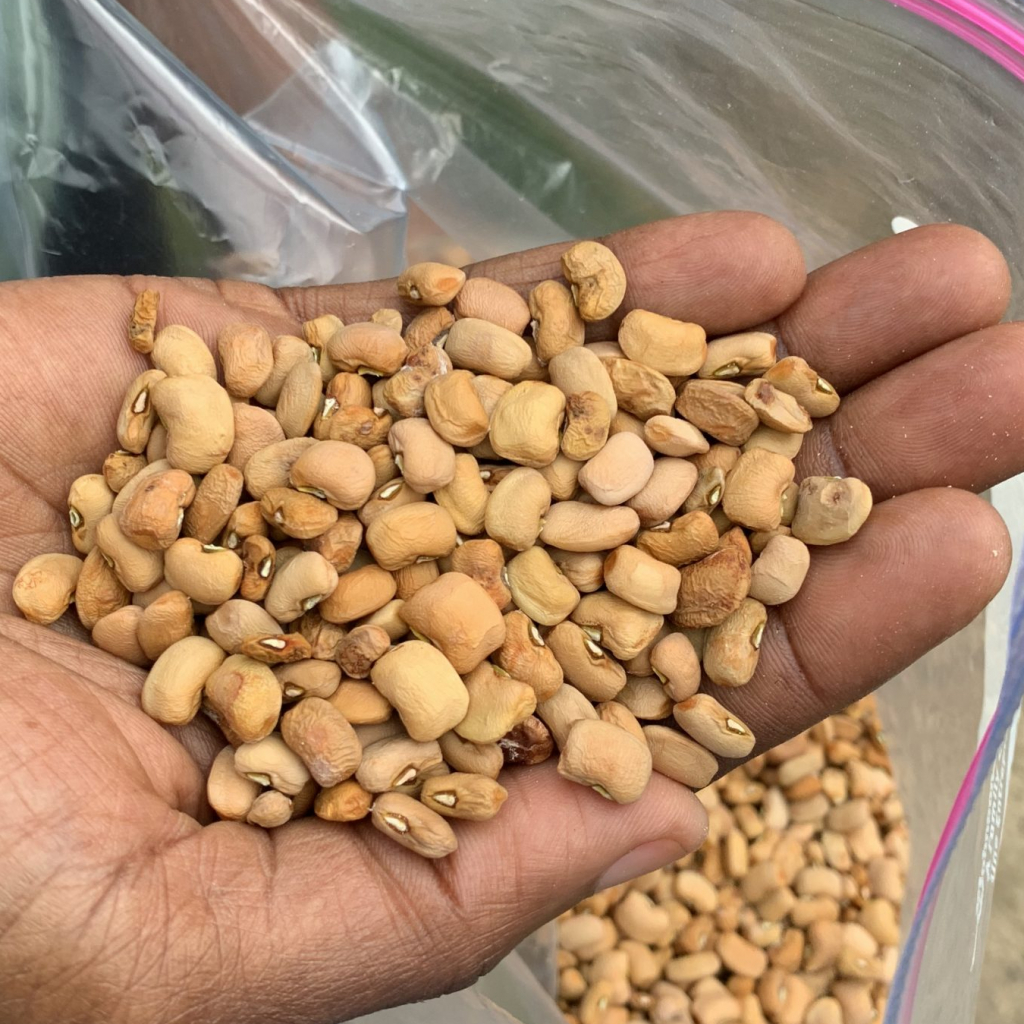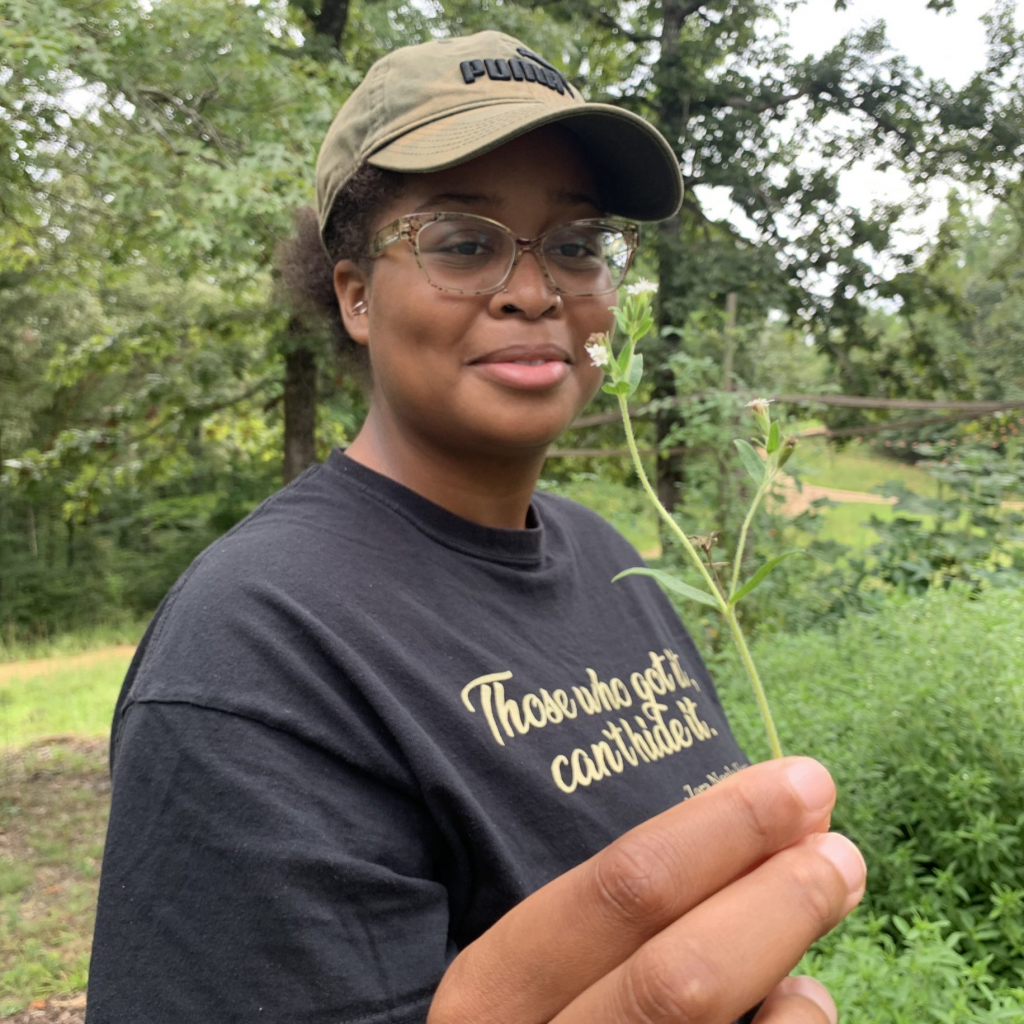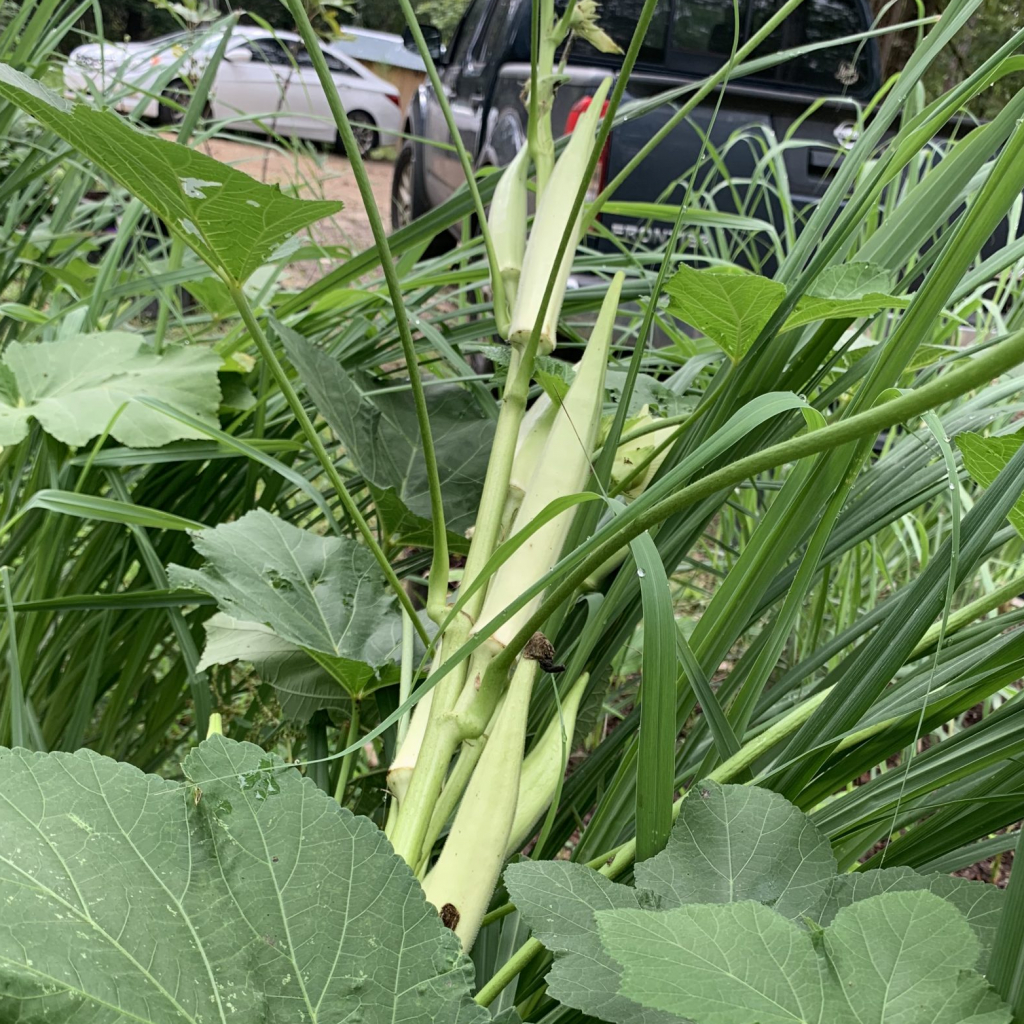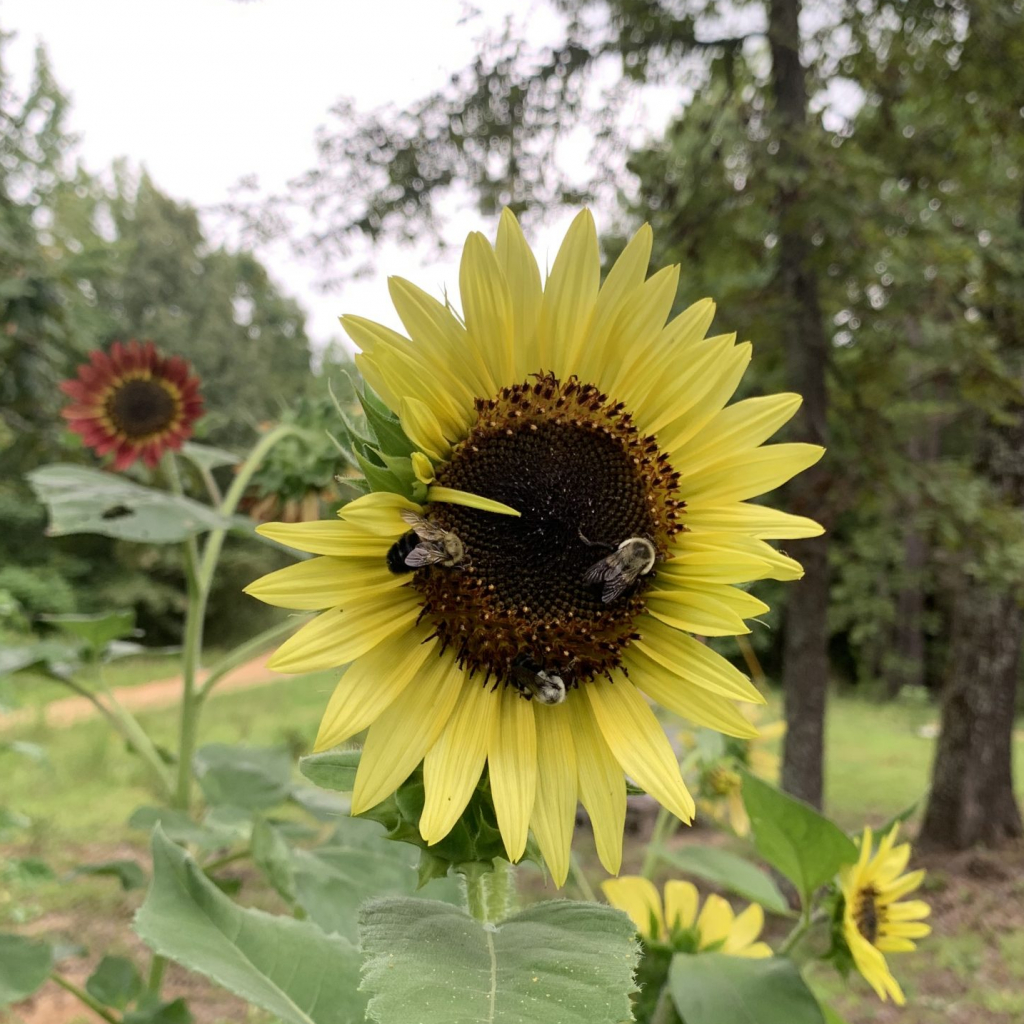Farm Report: Justevia & Gimbia’s Kitchen
September 6, 2022It’s high summer in Velma, Mississippi, when everything around here verges on tropical. The farm at Halima Salazar’s place in Yalobusha County is teeming with white velvet okra and hibiscus, with purple hull peas and honey beans native to her home country of Nigeria, with turmeric and ginger and an abundance of mint. There’s even an experimental patch of indigo.
Much of what Halima and her farming partner Dria Price grow for their tea line Justevia, their Gimbia’s Kitchen pop-up dinners, and the heirloom seed company Truelove mirrors farms and gardens throughout West Africa. It tells the story of Halima’s migration across the ocean to attend college in Texas. It feels at once deeply familiar and newly strange, like you’ve been transported deeper into the essence of North Mississippi, this place you never stop discovering. For Halima this balancing of cultures feels like home.
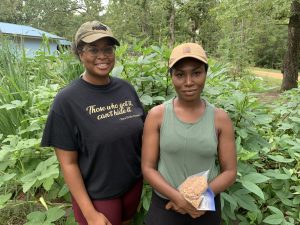
Dria Price and Halima Salazar
“I grew up seeing women from different tribes use the same ingredients to cook food and make it look and taste different,” she tells me. “Since coming to the U.S., both before and after college, I’ve kept thinking about the similarities between our food and Southern food.”
Inside the sky blue cabin where Halima lives with her husband and two children, the walls made of hand-hewn pine are decorated with masks and fabrics made by Nigerian tribes. Like the food she cooks, her upbringing is a melting pot of different tribes: Yoruba and Hausa-Fulani. The kitchen is immaculate with butcher-block counters, a giant farm sink, and a crown jewel of an Italian range.
Halima hands me a plate steaming with a West African porridge recipe she’s testing for a welcome reception for new students and staff at the University of Mississippi’s Southern Foodways Alliance. The first bite is warm and inviting, an initial kick from cayenne and scotch bonnet peppers grounded by the earthy softness of sweet potato and beef.
“It needs to be a little less spicy before we can serve it,” Halima says with a furtive smile. Nigerians are used to a little heat, she explains, so she has to tone down the recipes for American eaters.
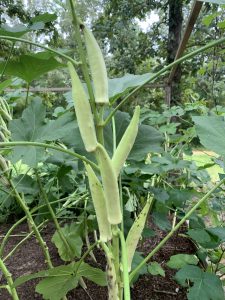
White Velvet Okra
Halima and Dria’s patchwork farm is pieced together between yards and empty lots from Velma to Oxford. The beds are small and full, more on the scale of home gardens. Together they make a farm. There’s plenty to eat, but most of the off-beat varietals, from the honey beans to the white velvet okra to a Nigerian amaranth green called Efo Aleho and indigo, are being grown for Truelove Seeds, a Pennsylvania-based heirloom farm collaborative dedicated to preserving culturally important heirloom vegetables, herbs, and flowers.
For Dria the seeds are just as powerful as the food that contains them.
“I think about that when I harvest a basket full of peppers from a single pepper plant that I grew from one single pepper seed,” she says. “And the fact that each pepper that I harvested has enough seeds to grow hundreds more peppers in the future. I love the fact that I can put a few little seeds in the ground and grow enough to feed my household and share with people around me.”
This was a gospel that Dria learned at the Oxford Community Market (OXCM) from Leonard Brown, a beloved farmer who grows herbs, tends goats, and partners in a mushroom cultivation project with Alcorn State University on his land around Velma. An Oxford High School alum with a bachelors degree and a graduate degree in Dietetics from the University of Mississippi, Dria spent her early life in Chicago and was trying to rediscover her family’s roots as farmers and subsistence landowners.
“Living off the land is how many black people were able to survive when we didn’t have rights to enter certain places or money to afford the basics,” Dria says, explaining how empowering one’s community through food is a Mississippi tradition. “The reliance on convenience and lack of knowledge regarding how to grow/make our essential food items could mitigate the descent into food insecurity, which has long lasting effects on both our bodies and mental health. This is something that activists such as Fannie Lou Hamer have been talking about for decades.”
Brown offered her a way to reconnect with those ancestral food ways. “I remember Mr. Brown saying that God gave us plants that grow better after being clipped as His way of making sure that we always have food.”
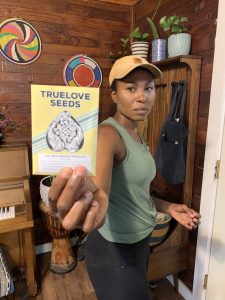
Truelove Seeds
This was 2019. Halima, who had just moved to the Batesville area with her family, met Brown around the same time to buy some of his goats. The two began volunteering for him, trying their hands at farming, and soon Halima and her family moved deeper into their Mississippi journey, south of Water Valley to Velma.
“Over the last three years, we haven’t stopped going, and we’ve started so many new ventures since then,” Dria says.
Inspired by Brown, they began growing and drying their own herbs and started the herbal tea company Justevia, named after the natural sweetener found in each blend. The teas, little harmonies of comforting herbs such as hibiscus, mint, tulsi basil and lavender, are popular at OXCM, the Tuesday farmer’s market at the Old Armory Pavilion. You can also find them on the shelves at Chicory Market and in our Iced Hibiscus Tea on the counter.
As farmers in the OXCM community, Halima and Dria have found other ways to contribute their talents. Halima, who went to culinary school back in Nigeria, began to present Nigerian food popups at the market under her brand Gimbia’s Kitchen – “gimbia” the word for “princess” in the Hausa language in remembrance of her grandmother. “My passion is to show people that African food is diverse and incredible and is not just Jollof,” she says.
She met Corbin Evans of Oxford Canteen, and presented several dinners there and at Chicory Market. Dria, a talented baker, met Vishwesh Bhatt of Snackbar and moonlighted as a guest chef on their dessert menu.
The growth in their farm business has been community-based – organic in the most literal sense and by necessity. And their hard work is starting to pay off. In June they were one of 10 farms across the country to be awarded Braiding Seeds Fellowships by Soul Fire Farm, a community farming foundation with a mission to lift up African-American and indigenous farmers and their work in creating food sovereignty. During the 18-month program, Halima and Dria will receive grant support and professional development to learn and grow as farmers.
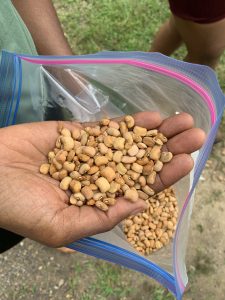
Honey Beans
“Something that makes this journey easier is forming a community with other farmers, including those who do not come from farming backgrounds, women, younger people, and especially black farmers,” Dria says. “The Braiding Seeds Fellowship has helped us find more people like us who are passionate about the Earth, farming, and do not look like the typical farmer in our area.”
For Halima, farming in a place like Mississippi, where eating well is such a public health issue, is also an outward facing mission. “To be an example to the next generation of people of color, so they know that fresh food is not about gentrification and that we all should have equal access to it. If kids don’t see people who look like themselves growing food, they won’t know they can also take ownership of what goes onto their plate.”
On October 2 and 3, the Gimbia’s team will be back at Snackbar to present an Anatomy Dinner with the Philadelphia-based physician and adventure writer Jonathan Reisman. After hearing Reisman talk about his book, The Unseen Body, on NPR’s Fresh Air, they messaged him and invited him to partner with them. This unique six-course dinner, inspired by Reisman’s “Anatomy Eats” series, features dishes prepared from liver, kidney, marrow, and other organ meat to explore new recipes inspired by old food ways and to make delicious use of whole animals.
All of these opportunities have Dria and Halima dreaming big. To make their farming operation whole, they’re looking for a contiguous stretch of land to purchase in Lafayette County. Meanwhile, they are building a second greenhouse funded by a Natural Resources Development Council grant from the USDA.
As much as Justevia and Gimbia’s Kitchen grow, for Dria it all goes back to that single seed.
“What I love is how a simple seed can create such an abundance that you can form a community based on generosity.”
~ John Martin

